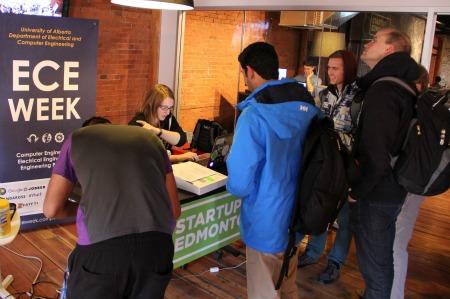
Computer Engineering Club president Brittany Lamorie, centre, checks teams in at the third annual ECE Week hackathon.
(Edmonton) Eighty people on 27 teams used up 24 hours and consumed countless flats of Coke and Red Bull at an annual hackathon organized by the University of Alberta Computer Engineering Club. But in the end there could be only one winner.
Software engineering student Indragie Karunaratne completed a solo project called Ares, a service capable of transferring files between computers and phone and peer to peer by bypassing the Internet, Bluetooth, and local wi-fi.
"Those services exist but people still email files to themselves or use airdrop (Mac). But speed and flow aren't as simple as they could be," said Karunaratne, who is in his fourth and final year of engineering. "This simplifies the service to the very basics. It's a two-step process from transferring a file from your Mac to your phone."
He describes the project as being basically three apps-or an entire ecosystem, adding that what clinched the win was focusing on proof of concept rather than building in extra bells and whistles.
"What wins hackathons is how good your demonstration is, so instead of coding additional features, like transferring from the phone to the computer, or transferring multiple files simultaneously, I focused on polishing the demo so it wouldn't fail."
Nathan Doraty, a second-year computer engineering student, worked on a similar project with his team-coming in third place.
He and teammates Nathan Liebrecht, James Hryniw and Nicholas Westbury (who participated virtually, from Waterloo) designed and built an app that unifies the clipboards on your phones and computers. The app, called Copy Everything, allows users to copy a url or text from their phone and paste it into a browser or document on their computer.
"We found you could have four or five computers sharing the same clipboard," said Doraty, adding that the group is looking at different ways of monetizing the app.
The hackathon wrapped up a series of tech talks and industry mixers designed to bring local computer engineering students and industry together.
Computer Engineering Club president Brittany Lamorie says the marathon nature of hackathons spawn a culture of their own, in which teams end up tasting sweet victory and bitter defeat from hour to hour.
"Teams come in with a project and mind that think "This will be easy" then they hit a bug and it takes hours and hours to solve," she said.
Sleep deprivation takes its toll. Karunaratne says at one point he went home to get some sleep because he was no longer producing quality work. Doraty says he "accidentally" fell asleep when he took a break after about 18 hours or work.
Perhaps because of that cultural aspect, or the way these events connect students with working professionals, or both, Lamoire says the hackathon has grown into a popular fixture with students.
"This is the biggest one we've ever had-it was packed," she said. "In 2014 we had less than 60 people and this year that many people signed up in four days and we weren't really advertising it a lot. It's a thing now, and people know what it is and they were showing up prepared, with teams and projects in mind."